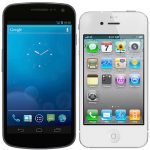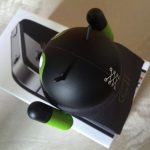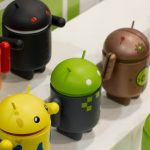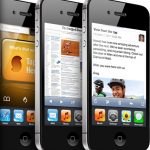Samsung accounts for 40% of Android smartphone sales

The figure is so important, I'm breaking it out from the long analysis posted mid-afternoon about the smartphone market consolidating around Apple and Samsung. The South Korean electronics giant is doing to Android on smartphones what Amazon does on tablets: Hugely fragment the market around a forked operating system. I warned about this three weeks ago in post "Google has lost control of Android". Now there is sales data to back it up.
Earlier today, Gartner released first quarter sales data for global handsets. Not shipments into the channel, but actual sales to end users. Market leader Samsung accounted for 40 percent of all Android smartphone sales, with no other manufacturer topping 10 percent. Sure Samsung's success lifts overall Android smartphone share -- 56.1 percent up from 36.4 percent a year earlier. But what's good for Samsung isn't necessarily in the best interests of the broader Android ecosystem.
Smartphone market consolidates around Apple and Samsung

Today, Gartner put to end weeks of cellular handset debate. Apple apologists disputed Samsung's smartphone success over iPhone -- the presumption that the South Korean electronics giant benefits from greater shipments vs actual sales. Make no mistake: Samsung is the global leader overall and in the smartphone category, based on actual sales. Apologist arguments be damned.
That said, Apple's position is solid. Together, Apple and Samsung combined smartphone sales market share approaches 50 percent. Contrary to speculation that Windows Phone might appear as a third dominant mobile OS, the market is set to largely split between two vendors. As I explained three weeks ago in post, "Google has lost control of Android", Sasmung's rise isn't necessarily good for the broader ecosystem.
You can have iPhone 4S, I'll take Galaxy Nexus

During the last six months, I've had the privilege to use three exceptional smartphones: iPhone 4S and two Galaxy Nexus variants -- one LTE and the other HSPA+. You can't go wrong buying either Android or iOS handset, although Galaxy Nexus supports more carrier networks here in the United States. Differences that matter are more than hardware (such as size, appearance or battery life) or software (apps and operating systems). Taking Galaxy Nexus or iPhone 4S is much more. Either is a digital lifestyle choice that many buyers won't grok before paying their hard-earned cash.
I can't emphasize this aspect strongly enough. In the days before Android and iPhone, early smartphone buyers also made digital lifestyle choices, such as BlackBerry users and persistent email or Windows Mobile buyers wanting mobile Office. But today, with differentiated, connected cloud services, digital lifestyle matters more than ever, and both handsets offer similar yet drastically different experiences. You're not just buying a phone but a way of life.
Google+ puts iOS ahead of Android

May 9 is, in a way, a watershed day for Android -- and that's not necessarily a good thing. Many developers I communicate with repeatedly say they confront the same quandary: Android or iOS first? Maybe they choose to develop for iOS, only to ask: Android or iPad next? Google is a software developer, too, and this day put its priorities in order with a stunning iOS-first update. The new iPhone app for social network Google+ is stunning, breathtaking, immersive and makes the already great experience on Ice Cream Sandwich seem outdated -- although some of the best visuals migrate to iOS.
In a way, Google sets the wrong example for its development partners by putting iOS ahead of Android. But why not? The iOS install base is larger than Android (365 million to 300 million at last reveal); countless analyst surveys show that iOS device users are more connected and engaged; and fragmentation isn't a problem since the majority of the iOS install base is on the newest version (versus about 5 percent of Androids). Google wants Plus to succeed in a big way, so improving the experience everywhere should be a priority. But iOS first, for the next big thing, is the priority.
Android rises over fallen iPhone

I must really be asleep at the wheel. How could I have possibly missed this nearly week-old sales data: iPhone's fourth-quarter sales surge against Android was a blip on the screen. Chock it up to iPhone 4S launch combined with the saddest of sales motivators: Rock star's death halo, where album sales soar following an artist's death, or in this case iPhone following Apple cofounder Steve Jobs' tragic passing. Perhaps you have another reason. Regardless, sales don't lie.
Android smartphone OS market share, as measured in actual sales to people (and not shipments to stores), reached 61 percent during Q1 compared to a measly 29 percent for iOS/iPhone. That's a dramatic turnabout from fourth quarter when Android led by a narrower margin -- 48 percent to 43 percent. Still, like fourth quarter, the top-three selling smartphones were iPhone, iPhone and iPhone, as in 4S, 4 and 3GS in that order.
The mobile web is dead

Today, comScore released startling data about the mobile web, which bodes poorly for the browser. In March, the web browser accounted for just 18.5 percent of time spent online among US smartphone users. Mobile apps accounted for the rest. Now we know why Safari for iOS capabilities advance so sparingly: Apple sees it as irrelevant. Stated differently: Safari is to mobile what Internet Explorer 6 was to the desktop 10 years ago. Apps matter more to both developers.
Qualifying that one country does not the whole world make, the US data nevertheless foreshadows future trends and illuminates the past, demonstrating the wisdom of Apple's 2008 turnabout. When iPhone launched in June 2007, cofounder Steve Jobs couldn't say enough about Safari as a key user benefit. But by early 2008, Jobs and company shifted emphasis to the App Store, which launched in July of that year. In essence, Apple bet against the web after foaming at the mouth about open standards. Apps better fit Apple's "our way or the highway" approach to end-to-end hardware, software and supporting services. Only Google can save the mobile web now.
Samsung smartphone shipments soar stunning 267%, trouncing iPhone

Apple apologists' brief respite is over. Late last week, IHS iSuppli and Strategy Analytics released first quarter data putting Samsung handset shipments ahead of Nokia, ending the Finnish company's 14-year reign. But the analyst firms couldn't agree on smartphones, with Strategy Analytics positioning Samsung ahead of Apple, but IHS giving the nod to iPhone. The Apple Fanclub clung to the "We're No. 1!" data, unsurprisingly. But the last word comes today from IDC, which corroborates Strategy Analytics, crowning Samsung king in both categories.
"The halcyon days of rapid growth in the smartphone market have been good to Samsung", Kevin Restivo, IDC senior research analyst, says. "Samsung has used its established relationships with carriers in a mix of economically diverse markets to gain share organically and at the expense of former high fliers such as Nokia".
Don't cry for me, iPhone

Mark April 16th on your calendars as a day to remember -- and not because your taxes are due tomorrow, Americans. The weeks ahead promise cool ways to spend your refunds (assuming the tax man giveth back to you). Some of the best smartphones will arrive this week, with a blockbuster announcement coming in 17 days -- from Nokia and Samsung and another Samsung but with a big dash of Google sprinkled in. And Apple? Aaaaaahnt! Sound the game show buzzer. LTE iPhone is nowhere to be seen.
Coming April 22nd are not one, but two tasty 4G treats. As previously announced, Nokia Lumia 900 Windows Phone comes to AT&T all decked out in white -- yours for 100 bucks. Meanwhile, announced today, for an extra C Note, Sprint subscribers can get Galaxy Nexus along with fat $50 credit to put in their Google Wallet; the only real Google phone comes to the only national carrier with unlimited data. Looking ahead, Samsung today dispatched invites for a splashy May 3rd launch event -- it's the next Galaxy phone, baby. Don't cry for me, iPhone!
Uh-oh, iPhone fanboys

iPhone Idolators, please meet the Android Army. Now retreat! Android's share of the US smartphone market topped 50 percent in February, according to comScore. iOS gained share but trails considerably -- by like 20 points. You can have your iPhone, but many more Americans take Android. I'm waiting. What's your smarty-pants response to that, Apple apologists?
The findings butt against those from Nielsen -- a life raft of apology for those insisting iPhone will rule the world. Last week, Nielsen reported a huge surge in the number of new purchasers choosing iPhones compared to Android. For the three months ending in February, 48 percent of Americans who recently bought a smartphone, chose Android -- 43 percent iPhone, according to Nielsen. A year earlier, 27 percent of new acquirers chose Android versus 10 percent for iPhone.
iPhone is unstoppable

Now there's a headline I never expected to write, particularly following "Android is unstoppable" nine months ago. But in the United States, at least, iPhone has nearly matched pace with Androids. Looks like the Apple apologists will get their day. After years of wrongly boasting iPhone's leadership over Androids, they might yet be right.
For the three months ending in February, 48 percent of Americans who recently bought a smartphone, chose Android -- 43 percent iPhone, according to Nielsen. Those numbers are up considerably for both, but iPhone surged to close the gap, following the release of the 4S in October. A year ago, 27 percent of new acquirers chose Android versus 10 percent for iPhone.
Switching from Android to iOS

Google’s Android and Apple’s iOS dominate the smartphone market with hoards of fans willing to fight tooth and nail for their platform of choice. What is it really like moving from one to the other? I found out.
I made the move from Android to an iPhone 4S over the weekend and reactions have, as expected, been mixed ranging from the disparaging “a downgrade” to “welcome to the club, you won’t regret it”.
US iPhone ownership catches up to Android

That's one of the startling data points from a report that Pew Internet released today. The non-profit "fact tank" asked American adults what kind of smartphone they own. Twenty percent responded "Android device", up from 15 percent in May 2011. iPhone: 19 percent, up from 10 percent during the same time period. Pew concluded the newer survey in February.
The percentage of people saying they own iPhone nearly doubled between surveys, which is stunning growth compared to Android. Meanwhile, BlackBerry ownership fell to 6 percent from 10 percent. Those respondents describing themselves as Windows Phone owners was unchanged, at 2 percent.
Apple is winning the mobile platform wars

In October 2009, I explained why "iPhone cannot win the smartphone wars". Many of the reasons then still hold true today. But I wrote that analysis before Apple released iPad. So, 10 months later I followed up with "Apple can still win the mobile platform wars, but it won't be easy". Now, 18 months later, as Mobile World Congress starts in Barcelona, Spain, I claim: Apple is winning the mobile platform wars, but achieving ultimate supremacy won't be easy.
In August 2010, I observed: "Pundits already are predicting iPhone's death brattle before the great Android god. I wouldn't write off Apple just yet. The mobile wars are bigger than smartphones, as Apple already has shown". Little has changed since. Android apologists still predict victory over iOS, while ignoring fundamental platform gains that put Apple in front.
Who wins if Android and iPhone lose the smartphone wars?

Finally, an analyst firm comes clean about the cell phone market's volatility. Gartner and IDC continue to make outrageous predictions -- like Windows Phone as No. 2 smartphone operating system in 2015 -- despite many earlier forecasts being drop-dead wrong. But comScore says pretty much anything can happen and likely will.
That's a stunning assessment, considering Androids' and iPhone's 2011 success, as highlighted in comScore's "2012 Mobile Future in Focus" report. iPhone 4 -- right, not 4S -- was the top-acquired phone in the United States and five combined Euro countries (Germany, France, Italy, Spain and United Kingdom) last year. Android led among smartphone operating systems.
iPhone 4S sure is a slowpoke

The question I have: Why doesn't it matter?
Over the weekend, iPhone 4S and I spent some quality time together. My interest: How does the user experience compare to Galaxy Nexus? There certainly are differences, but the most startling, at least in San Diego, Calif., is data speed. Verizon's LTE network kicks ass, while AT&T's HSPA+ -- on iPhone 4S -- does not. Hey, why walk 30 miles to work when you can drive there?
Recent Headlines
Most Commented Stories
BetaNews, your source for breaking tech news, reviews, and in-depth reporting since 1998.
Regional iGaming Content
© 1998-2025 BetaNews, Inc. All Rights Reserved. About Us - Privacy Policy - Cookie Policy - Sitemap.